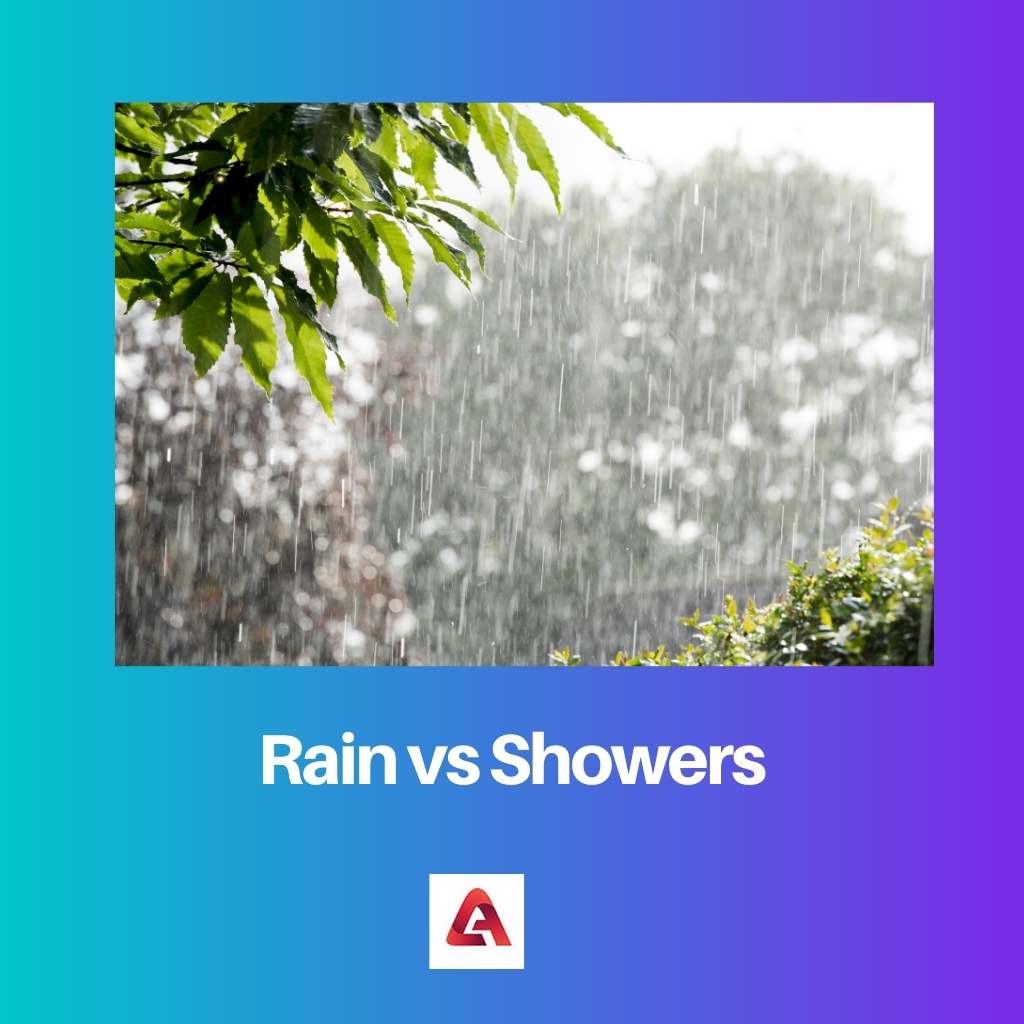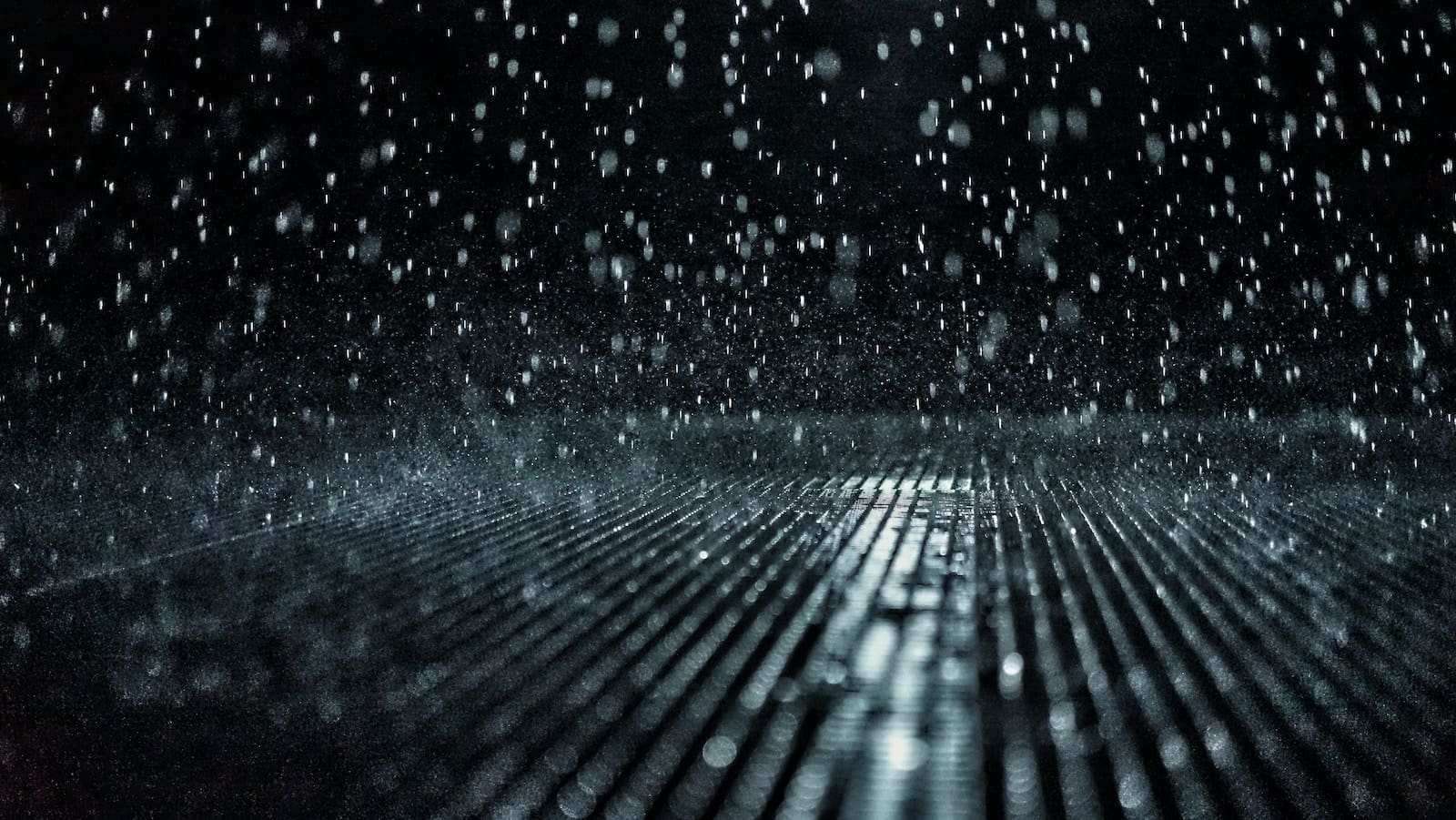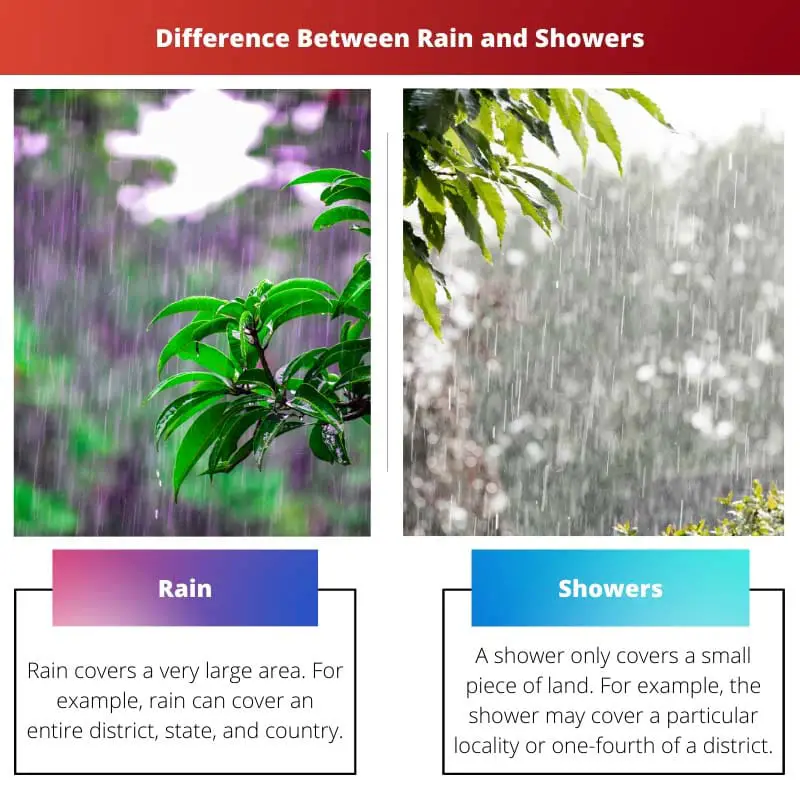There are certain words whose meanings may appear to be the same but are different and distinct in various aspects.
Two such words are rain and shower, whose meanings may appear to be the same, but both of them differ from each other in various domains.
Key Takeaways
- Rain refers to a steady, continuous form of precipitation, while brief, intermittent bursts of precipitation characterize showers.
- Showers can develop and dissipate rapidly, making them difficult to predict, whereas rain persists for longer periods and is more predictable.
- Rain covers a larger area, while showers tend to be localized and can vary greatly in intensity within short distances.
Rain vs Showers
Rain is a type of precipitation that happens over a large area and it is caused by orographic effects and also human activities that release CFCs into the atmosphere. Showers are a type of precipitation that only covers a small surround, and they are difficult to predict when they’ll happen.

Rain demonstrates the process of evaporation that results in the formation of clouds which, when becoming heavy, burst and result in rain.
One of the major sources of fresh water on the Earth is rain which fills up all the freshwater lakes and streams. One of the major sources of water for irrigation is also provided by rain.
A shower is a type of precipitation that begins and ends abruptly and is of varying intensity and power.
Some experts define showers as rains from individuals and a few clouds over a small area for a short duration. Showers are mostly unexpected and cannot be predicted.
Comparison Table
| Parameters of Comparison | Rain | Showers |
|---|---|---|
| Area of Coverage | Rain covers a very large area. For example, rain can cover an entire district, state, and country. | A shower only covers a small piece of land. For example, the shower may cover a particular locality or one-fourth of a district. |
| Occurrence and Prediction | Rains can be predicted easily by the meteorological department and the rain develops slowly and steadily. | Showers are difficult to be predicted and start and end very abruptly. |
| Time duration | Rains last for a comparatively longer period. | Showers last for a comparatively shorter period. |
| Type of clouds | Stratus clouds are a source of rain. | Cumulus clouds are the origin of showers. |
| Number of clouds | During rainfall, a large number of heavy-filled-up clouds are involved. | One of the major features of showers is that there are only a few clouds or a single cloud involved in the process of precipitation. |
| Advantage | Rains are a major source of fresh water and also provide water for irrigation. | Showers do not serve any major purpose but can change the weather of an area for a day. |
What is Rain?
Rain is a form of precipitation that occurs over a large area. The major causes of rain are:-
- The most important cause of rainfall is the frontal activity that takes place as a result of the slow and steady forward moving of air.
- Another cause of rain is the Orographic effect, in which rainfall takes place on the Windward side of mountains.
- Human activities are also one of the causes of rain. For example, the CFCs from appliances and pollutants from cars and factories also increase the chances of rainfall.
Stratus clouds are the origin of rain which is one of the most widespread phenomena. Rain has a great impact on the agricultural prosperity of a country.
All the trees and plants need an adequate amount of water to survive and grow; thus, rain provides the necessary water for these crops and plants. For example, tropical plants require adequate inches of rain to survive.
Rain also has a large number of cultural and religious significance. In India, rain is considered to be a god and is worshipped so that the rain brings prosperity.
Excessive and heavy rainfall sometimes brings heavy destruction and natural calamities like floods that eventually lead to several human casualties.

What are Showers?
Showers are abrupt and immediate types of rain that cover a comparatively smaller area when compared to rain. One of the major features of a shower is that it is referred to as patchy, which means it covers a small area.
Showers are produced by convective clouds which are known as cumulus clouds. Cumulonimbus is large cumulus clouds that move very high up in the atmosphere and thus lead to snowfall instead of rain.
Showers make the weather of a place more humid and moist which is problematic for many people in that particular region.
Showers are highly unpredictable and cannot be judged earlier by the meteorological department; hence one can expect a shower any day.
Showers are very common in places that are humid and moist, like Indonesia, Cape Town, and the Maldives. Showers take place from individual big clouds rather than a large pack of clouds.

Main Differences Between Rain and Showers
- Rain covers a comparatively larger area. For example, rain covers an entire district, state, and country. On the other hand, a shower covers a comparatively smaller area like a small region in a particular district.
- Rains are easily predicted by the Meteorological department, whereas showers cannot be predicted by the meteorological department as they are highly abrupt.
- Rains occur for a longer duration, say for 1 day or even a week. On the other hand, showers take place for a shorter duration.
- The source of rain is stratus clouds. On the other hand, the source and origin of showers are Cumulus clouds.
- A large number of clouds are involved in the entire process of rain, whereas only individual clouds are involved in the process of showers.
- A large number of purposes are served by rain, whereas showers do not serve any such major purpose.


This article provides a very comprehensive and informative comparison between rain and showers
It has been rightly pointed out that rains are easily predicted by the Meteorological department, whereas showers cannot be predicted
The article very eloquently explains the key differences between rain and showers in a very informative manner
The article provides a very educational overview of the differences between rain and showers
Rain and showers are meteorological phenomena that are used interchangeably which this article has done a very good job of differentiating
A very detailed and comprehensive comparison of rain and showers with clear scientific references which makes the article highly informative
A clear and concise explanation of the main differences between rain and showers in an informative and highly intellectual manner